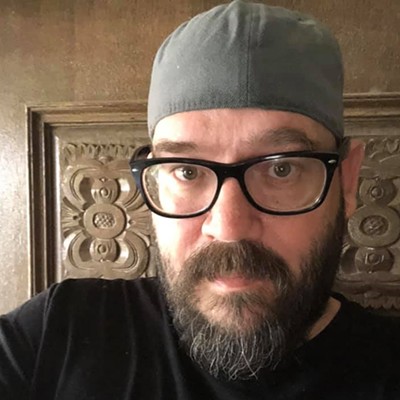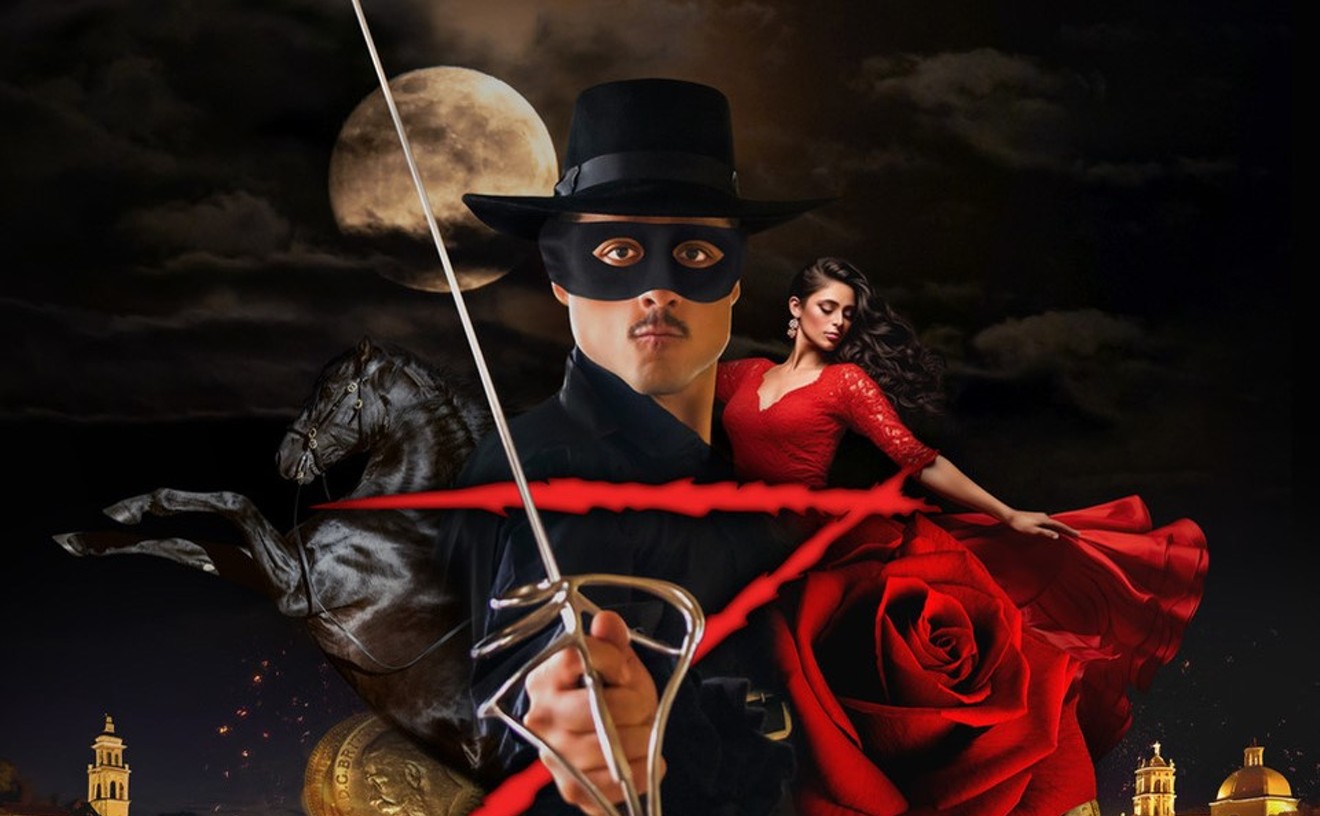When most folks pass through the San Carlos Apache Indian Reservation they likely see nothing but its blight, squalor, and the harsh living conditions of the desolate landscape. Artist Douglas Miles, however, sees nothing but inspiration for his work.
That includes all of his most recent ink on paper drawings and stencil work creations, all of which is included in his exhibition "Apacheria," which opens tonight at Por Vida Gallery on 16th Street.
Miles has spent most of his life on the vastly rural San Carlos reservation, which is located 100 miles northeast of Phoenix near the mining town of Globe. And he's spent the last 25 years creating a vast body of work that reflects and the hardships of "rez life" while celebrating its culture. The 48-year-old's oeuvre crosses into multiple mediums, ranging from his cartoon-like ink sketches on paper and canvas to the decorated decks of Apache Skateboards, the company he helped launch in 2002.
"What I've been doing with my work is to make a definite reflection of the hardness of what its like to live in a rural Native American community in the 21st century," Miles says. "There's so many stereotypes when it comes to cliché Native American imagery and I've been creating something that challenges and changes those perceptions. There are very beautiful things about our culture, but there's also a very harsh side that some people don't see because of the rose-colored glasses of any romantic notions they might have about Indians."
He's created murals on the sides of buildings in San Carlos, posters about violence prevention as a social worker, or any other outlet for his art wherever and whenever possible. That also includes filmmaking, as Miles helped produce two film projects - Apache Chronicle and Love is a Losing Game - about life on the reservation.
The 20 different works comprising the "Apacheria" exhibition - including handcut and hand-drawn stencils, murals, and drawings - are all created in the stark black and white comprising Miles' artistic style, which evolved from pop art and comic books and was honed even further with graphic design training.
"I've really Focused the past few years refining my work and my drawing and my designs to where they can have an immediate impact on the viewer," Miles says. "I've become really focused on the lines and have a certain immediate feeling or soul to the work. But if you look closely at my work, you'll see its not perfect, its not pretty, but its imperfections make it perfect."
There's a big focus on mixed media in "Apacheria," he says, including an emphasis on found objects.
"I've done a lot of ink on paper for the show, but also a lot of the found objects I've discovered on the reservation," Miles says. "I'll also be painting right on the walls of the gallery."
And to be perfectly honest, Miles says, he'd really like to "do away" with anything having to do with a traditional canvas, frame, or matted pieces entirely.
"It's boring and almost constricts the work sometimes too, limiting the way people think about how to make art," he adds. "If I could I would do away with all of the typical mediums, I would. In some ways, I treat the entire world as my studio. A real artist would paint the moon if you'd let them."
All aspirations of holding the first exhibition on the moon aside, Miles says that using found objects for art - be they old cars, pieces of wood, or abandoned buildings - it "has a lot to say about life and death and resurrection."
Other works have other signifigance for Miles. For instance, "My Babe," - featuring the door of a clothes dryer spray-pained with the stencil of a Apache female holding a revolver - embodies his feelings about Native American women.
Its an old dryer door that broke at our house. I was like, I'm not throwing this away I'm gonna turn this into art. And in any household, women are burdened with so many things to do. They're masters of the household," Miles says. "And I've gotten tired of seeing the cliché of the shy, demure, meek Indian women in artwork. Because the women I grew up with - my mom, my sisters, my aunts - they're the masters of the household. And most women will do anything to protect their children and family. To me, its a tribute to strong Native women."
Miles also believes that the documentary Apache Chronicle and the short film Love is a Losing Game, both of which will screen at FilmBar on Saturday, shakes up common-held beliefs about Indians, as well as how he started Apache Skateboards and how it helped bring together many of the youths of San Carlos.
"What's more non-stereotypical as Indian kids skateboarding? Film is just another way to show the reality of our life as people in a non-stereotypical way that nothing to do with cliches or politics. It doesn't have to have some heavy meaning, it could just be for fun. The films that we're making are for the love of art and the love of skateboarding. Its not always some heavy anthropological and ethnographical."
The opening reception of "Apacheria: The Art of Douglas Miles" takes place from 7 to 10 p.m. tonight at Por Vida Gallery, 2800 North 16th Street. Admission is free. The screening of Apache Chronicle and Love is a Losing Game is scheduled to take place on Saturday at FilmBar, 815 North Second Street. Click here to RSVP.











